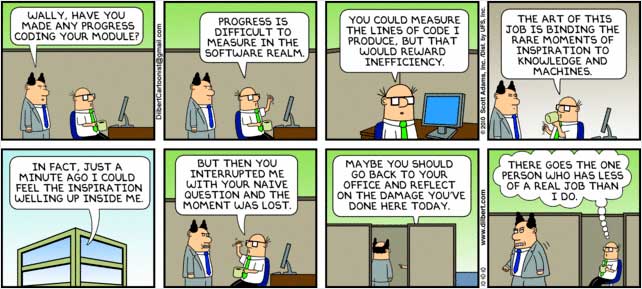 How much time do you lose each day to interruptions? Thirty minutes? An hour? Two hours? Are most or these interruptions of value? When you are interrupted, do you find that when you go back to what you were working on it takes almost as long to get back to where you were as it took to do the work originally? If so, all the work you did originally and all the time you invested are wasted. If you are one of the many people who are constantly interrupted, you'll benefit enormously when you use the ideas that follow to better control interruptions.
How much time do you lose each day to interruptions? Thirty minutes? An hour? Two hours? Are most or these interruptions of value? When you are interrupted, do you find that when you go back to what you were working on it takes almost as long to get back to where you were as it took to do the work originally? If so, all the work you did originally and all the time you invested are wasted. If you are one of the many people who are constantly interrupted, you'll benefit enormously when you use the ideas that follow to better control interruptions.
It helps to know that there are three types of interruptions:
- The personal interruption
- The wrong-time interruption
- The good interruption
Knowing the difference between these three and what to do about them will help you control them. You won't eliminate interruptions, but you can control them more effectively.
The personal interruption occurs when someone wants to chat—about the weekend, the game, the party, or whatever. The quick solution is to say that you have a deadline for a proposal, or other work you must finish, and that you'll catch up with the visitor another time. If you are managing your time well, you really will have a deadline and something to complete, so you are just being honest.
The wrong-time interruption happens when you want to speak to the person interrupting you, but at a later time. Use a similar response to the personal interruption, but more structured. First, if you are in the middle of writing or reading, keep your work posture. Look up with your eyes, but don't raise your head. (It sends the first signal that you are reluctant to be interrupted.) Don't put your pen or pencil down. Don't sit back in your chair. Instead, let the person know you are aware of him or her but that you have a deadline to meet, and then propose to visit when you're done or at the earliest time possible for you.
Most people will accept this alternative. Some will insist that they must see you now. Sometimes they may even get annoyed that you won't see them now. The best way to handle these situations is to alert people you normally work with before the next interruption. Explain ahead of time that there are certain times you prefer not to be interrupted. Explain why, and whenever possible, show them how it benefits them. People resist change; this gives them a chance to adjust.
A woman at one of my seminars worked for seven bosses. She told them, "When I have my pink cap on, it's not a good time to interrupt me." The pink cap may not be for you, but how about a traffic cone? That's what one manager told me she did. When I replied that it was a novel idea and asked where she got the cone, she said she'd rather not discuss it. If you communicate to people why you're doing something and do it with humor, people are more willing to accept it.
The good interruption happens when you must speak with the person now. It could be because it affects what you're working on now or because it affects another high-value activity that must be handled urgently (in other words, a crisis).
If you agree to stop what you are doing, get your papers and thoughts organized so that when you go back to them you can quickly recapture your thoughts. You should also set up a time frame: how long would it take to resolve this issue? Don't leave it open-ended. Get agreement to the time needed and explain that this way you'll be able to get back to your deadline. Stick to the time frame. Thank the person for his or her cooperation.
Most interruptions are of the untimely type. Unfortunately, too often we treat them as if they are appropriate. If someone approached you and asked for ten dollars, would you give it up? In most cases, probably not. Why, then, are we so willing to give ten minutes of our time? Don't give up on controlling interruptions. Even if you haven't been able to control them before, you will with the methods I've outlined here, and the payoff will be that you'll be able to concentrate your efforts and get your work done more quickly with better results.
Set aside blocks of time (thirty to sixty minutes) to complete work where you need to work uninterrupted. Let your calls go to voice mail or have someone else handle them during that time. Again, it's impossible to eliminate interruptions—but you can and should control them.
After a discussion during a program about how to control interruptions, one of the participants remarked to me that her customers were her interruptions. She worked in a bank and could not ignore the customers, she said. She added that she was required to submit a report every week and couldn't find the hour it took to complete it during normal business hours. I recommended that she ask a knowledgeable colleague to help the customers during the hour that it takes her to complete the report and that she try to arrange this during a slow time for the bank (not on Monday or Friday, for example). That is what I mean by controlling interruptions. (A bonus: she could also use the opportunity to delegate responsible tasks to someone she saw as having the potential to take on more responsibility.)
Think Time
A fellow who came up with a radically new design for a computer chip gained the insight about how to do it while he was walking during an extended time away from work. It was one of those eureka moments, he said. He said that he realized after thinking about the problem for some time that the difficulty with the current design methods for computer chips was that the instructions were wired into the chip. The chips got bigger and hotter as a result. He realized that many of the functions of the chip could be handled by software, which would lower the energy requirements. This is especially important for notebook computers. His design is in use in some notebook computers as a result of the insight he gained that day. If he had not given his mind a quiet time, he never would have realized the answer to the problem he had been working on for some time.
Give yourself time to plan and think. If you are going to be a leader in your field and make breakthroughs, you need to think about problems creatively. This is critical to your ability to come up with innovative solutions. It may even be a way to see problems differently and challenge the status quo as a result.
Time Wasters and Time Challenges
Eliminate or delegate time wasters; control time challenges. Time wasters are activities such as putting together sales kits, reporting information, and nonessential E-mail. Time challenges are activities such as preparing proposals, precall planning, and learning new products. A time waster is an activity that doesn't add value to what you do for your customers. It makes you less effective. A time challenge is an activity you need to do for your job, but could do more efficiently.




![Awesome Things You Need in Your Office [According to Officeprinciples.com]](https://lerablog.org/wp-content/plugins/wp-thumbie/timthumb.php?src=http://lerablog.org/wp-content/uploads/2014/10/image1-300x199.jpeg&w=300&h=140&zc=1)


